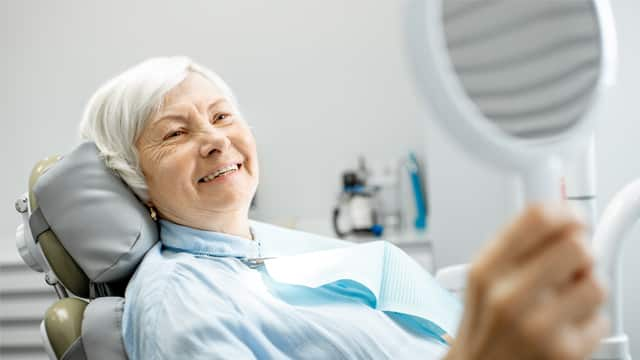How to Whiten Dentures at Home
If you want the convenience of whitening your dentures at home, a non-abrasive dental cleaner might be all you need to restore your dentures back to their former glory. According to the College of Dental Hygienists of Ontario, a quick overnight soak in denture cleaner will help loosen and remove stains and deposit buildup. Always talk to your dentist before trying any at-home cleaning methods or switching cleaning solutions.
How to Whiten Dentures Professionally
If cleaning your dentures at home isn’t making much of a difference, ask your dentist about getting them professionally cleaned. During a professional denture cleaning, your dentist can remove surface stains and polish your dentures to make them look like new. The best part? It only takes a few minutes!
Professional cleaning for your dentures is usually needed twice a year, unless otherwise recommended by your dentist. If you are concerned about the cost of professional cleanings, consider visiting a dental school for affordable dentistry or check to see if your area has low-cost or free dental clinics.
Preventing Denture Stains
The first thing you can do to keep your dentures stain-free, whether right after you get them or after whitening them, is to clean them daily. Every night, remove your dentures from your mouth, rinse them to remove any debris or food particles, then gently brush them with a non-abrasive cleaner and a denture brush or soft-bristled toothbrush.
Avoiding highly pigmented foods and drinks, such as coffee, red wine, berries and tomato sauce, also helps keep your dentures gleaming. But, no one expects you to stay away from these foods all the time. If you indulge in stain-causing food or drink, give your dentures a quick rinse or brush soon after to avoid the stains from setting in.
Whitening Methods to Avoid
- At-Home Teeth Whitening Solutions. While you may be tempted to try to whiten your dentures with at-home teeth whitening solutions, such as whitening toothpastes or bleach-containing products, the Mayo Clinic says these methods are generally not safe for your dentures.
- Abrasive Cleaning Products. Stiff-bristled toothbrushes, harsh toothpastes and cleaners can scratch your dentures and ruin their bright and shiny sheen.
- Hot Water. Giving your dentures a quick dip in hot water may seem like a good way to remove stubborn buildup, but hot or boiling water can actually warp your dentures and permanently damage them.
Dentures can lose their luster over time, but there are plenty of solutions that can bring your pearly whites back to life. Between at-home cleanings and professional whitening, you don’t have to settle for dull teeth. Chat with your dentist about the whitening process that works best for you.
This article is intended to promote understanding of and knowledge about general oral health topics. It is not intended to be a substitute for professional advice, diagnosis or treatment. Always seek the advice of your dentist or other qualified healthcare provider with any questions you may have regarding a medical condition or treatment.
ORAL HEALTH QUIZ
What's behind your smile?
Take our Oral Health assessment to get the most from your oral care routine
ORAL HEALTH QUIZ
What's behind your smile?
Take our Oral Health assessment to get the most from your oral care routine















